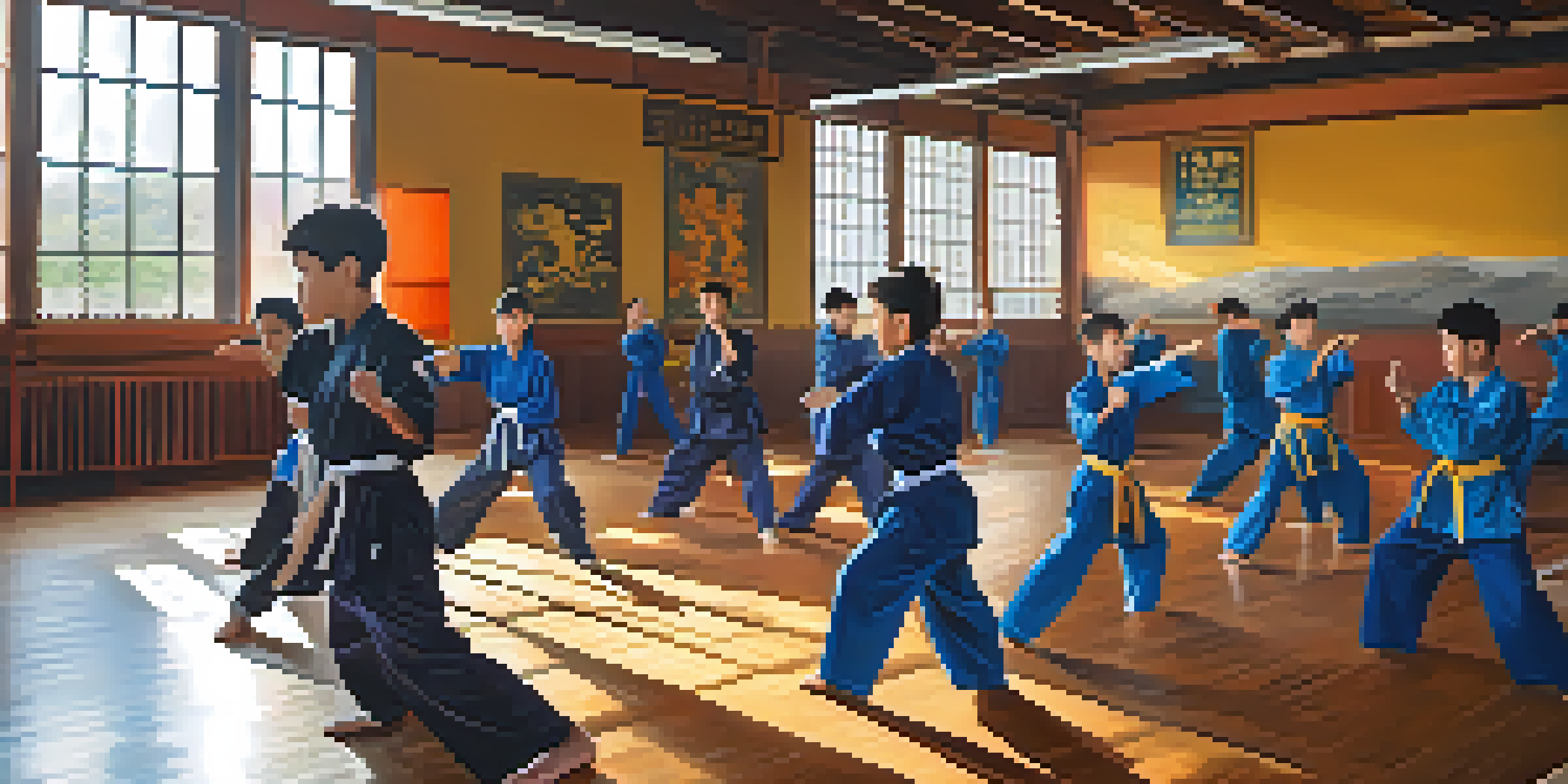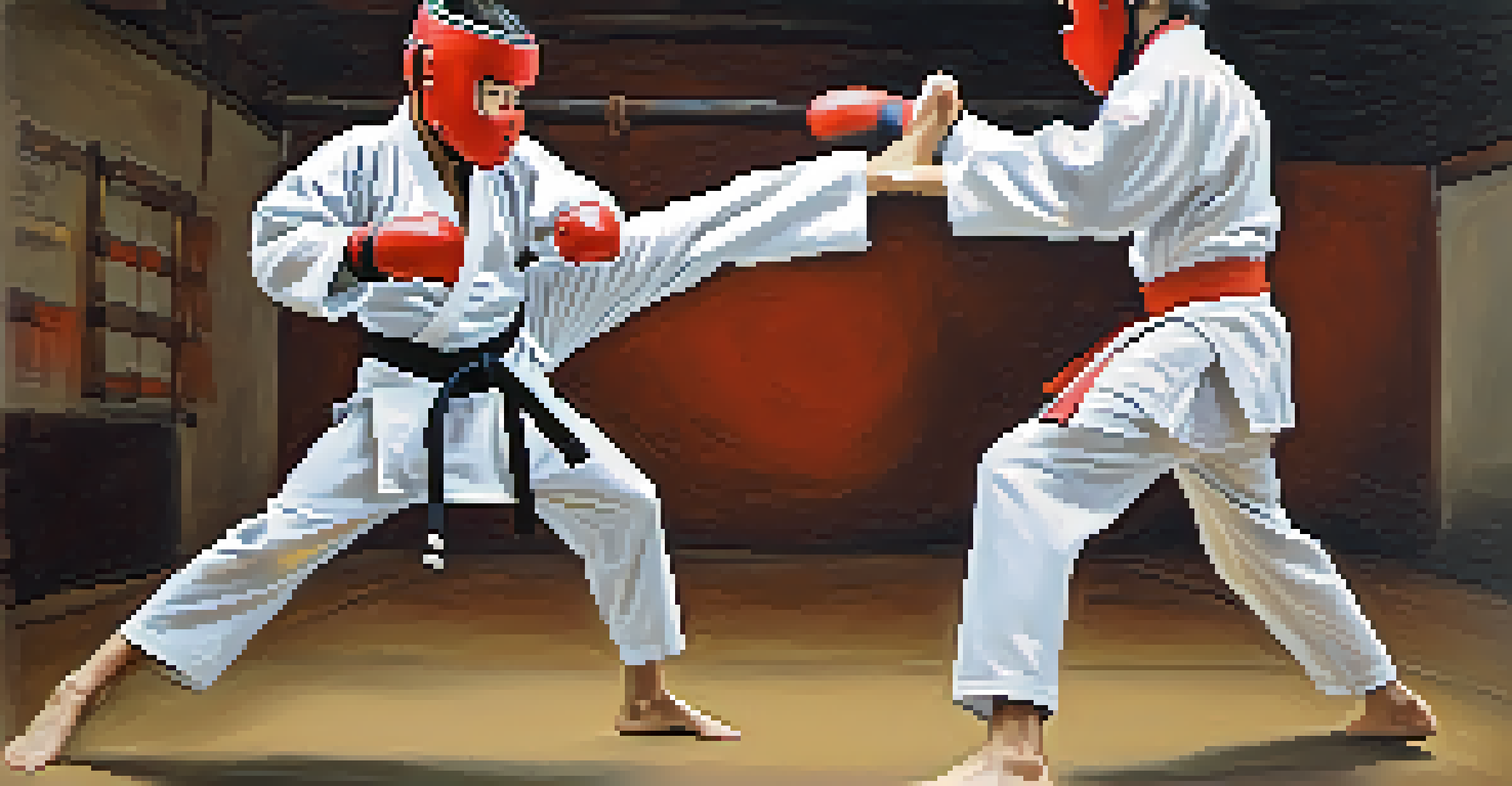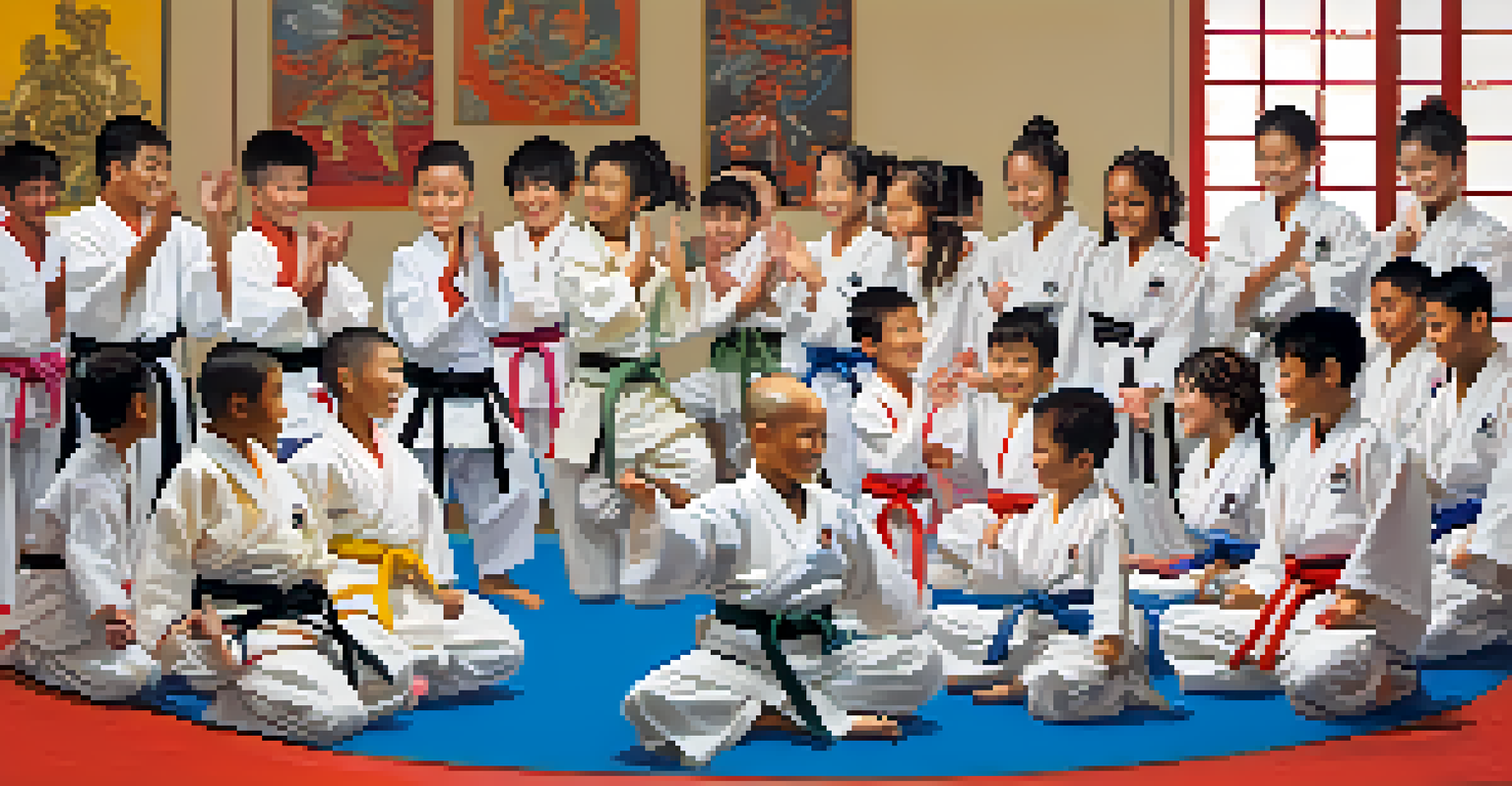How Martial Arts Encourage Teamwork and Social Skills

Martial Arts: A Unique Team Environment
Martial arts may seem like a solo endeavor, but they often thrive on teamwork. Practicing together creates a bond among students, fostering a sense of community where everyone supports each other. This collaborative atmosphere is essential for learning techniques and improving skills, as partners rely on one another for practice and feedback.
The strength of the team is each individual member. The strength of each member is the team.
In classes, students work in pairs or groups to practice drills, spar, or even perform choreographed routines. This not only enhances individual skills but also emphasizes the importance of cooperation. Just like a well-oiled machine, the success of a training session often hinges on how well participants work together.
Moreover, this social interaction helps students develop vital communication skills. They learn to express themselves clearly while also being attentive to their partners. This mutual respect and understanding are crucial, both on and off the mat, creating a supportive environment that nurtures personal growth.
Building Trust Through Sparring
Sparring is a core component of martial arts training that inherently promotes trust. When students engage in controlled sparring sessions, they must rely on their partners to maintain safety while pushing each other’s limits. This creates an atmosphere where trust is built through experience, as students learn to respect their partner's abilities and boundaries.

As students become more comfortable with their partners, they develop a deeper understanding of teamwork. They learn that sparring effectively is not just about individual skill but also about anticipating a partner’s moves and reacting accordingly. This dynamic interaction fosters a sense of camaraderie, as each participant plays a vital role in each other’s learning journey.
Teamwork Fosters Community Spirit
Practicing martial arts together creates bonds among students, enhancing their skills and fostering a supportive environment.
Beyond the dojo, this trust translates into everyday life. Students who learn to trust their sparring partners often find it easier to trust others in various social settings. This newfound confidence can lead to better relationships, whether it’s in school, work, or personal life.
Conflict Resolution Skills in Martial Arts
Martial arts training goes beyond just physical combat; it teaches valuable conflict resolution skills. Students often encounter challenges during training, whether it's a tough technique or a difficult sparring partner. Navigating these obstacles requires communication and problem-solving, fundamental skills that translate into real-life conflicts.
Alone we can do so little; together we can do so much.
As students work through these challenges, they learn to express their concerns and seek solutions collaboratively. This process encourages a mindset of cooperation rather than competition, teaching them that conflict can often lead to growth and understanding. These lessons are vital, especially in today’s fast-paced world, where effective communication is key.
Moreover, the emphasis on respect and discipline in martial arts reinforces the importance of handling conflicts peacefully. Students are taught to control their emotions and respond thoughtfully, equipping them with the tools necessary to address disputes constructively, whether on the mat or in their communities.
Encouraging Empathy and Respect
Empathy is a crucial skill that martial arts training helps cultivate. As students practice together, they are often encouraged to put themselves in their partner's shoes, understanding their strengths and weaknesses. This practice fosters a sense of compassion, helping students recognize the effort and challenges faced by others.
The structured environment of martial arts also instills a deep respect for instructors and peers alike. Students learn to appreciate the journey each individual is on, from beginners struggling with basics to advanced practitioners perfecting their forms. This respect extends beyond the dojo, promoting kindness and understanding in all interactions.
Trust Builds Through Sparring
Controlled sparring sessions promote trust and camaraderie as students learn to rely on each other's abilities.
As students grow in empathy, they often become more engaged members of their communities. They develop a mindset that values collaboration and support, which can lead to positive social changes. This shift in perspective not only enhances individual relationships but also strengthens the fabric of the communities they belong to.
Boosting Self-Confidence Through Teamwork
One of the most significant benefits of practicing martial arts is the boost in self-confidence it provides. Working as a team allows students to celebrate each other's victories, reinforcing a positive mindset. When students support one another, they feel empowered to take risks and step outside their comfort zones.
As they gain confidence in their abilities, students become more willing to engage socially, whether it’s participating in class discussions or joining community events. This newfound self-assurance can lead to lasting friendships formed through shared experiences. The dojo becomes a safe space where students can express themselves freely and without judgment.
Additionally, this confidence spills over into other areas of life. Students who feel secure in their martial arts abilities often find it easier to tackle challenges in school or work. The teamwork and support they experience in martial arts help them navigate social situations, leading to healthier relationships and a more fulfilling life.
Creating a Sense of Belonging
Participating in martial arts creates a strong sense of belonging among students. As they train together, they form connections that often extend beyond the dojo. This feeling of community is crucial for young practitioners, especially as they navigate social pressures in other areas of life.
Martial arts classes often include students from diverse backgrounds, providing an opportunity for cultural exchange and understanding. This diversity enriches the training experience, as students learn from each other and appreciate different perspectives. Consequently, they develop a broader worldview and enhanced social awareness.
Lifelong Skills for Future Success
The teamwork and discipline gained from martial arts training equip students with essential skills for personal and professional growth.
Ultimately, this sense of belonging helps students feel valued and accepted. They are more likely to engage positively with their peers, leading to stronger friendships and a more supportive social network. This environment encourages personal growth and fosters lifelong connections that often last well beyond their training years.
Lifelong Skills for Future Success
The skills learned through martial arts extend far beyond the dojo and serve students throughout their lives. Teamwork and social skills acquired during training provide a solid foundation for successful interactions in various settings. These skills become invaluable assets as students transition into adulthood and the workforce.
Moreover, the discipline and focus developed in martial arts help students excel academically and professionally. They learn to set goals, work collaboratively, and communicate effectively—all essential traits for success in any field. This unique combination of physical and social skills prepares them for challenges they may encounter later in life.

By fostering teamwork and social skills, martial arts cultivates well-rounded individuals ready to contribute positively to society. As they carry these lessons into their future endeavors, they not only enhance their own lives but also inspire those around them to grow and thrive.